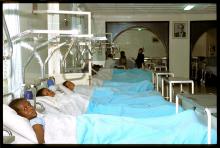half the sky

“An obstetric fistula,” I said, standing in the pulpit of my 200-year old church, “is a hole between a woman’s vagina and her bowel, or between her vagina and her bladder.”
The congregation’s discomfort was palpable. Later someone told me that they couldn’t believe that I’d had the nerve to say the “v-word” twice! It wasn’t exactly the effect I’d hoped to have, but it wasn’t entirely surprising.
Fistula is a childbirth injury that’s unknown today in the developed West, though before the advent of modern maternity care, it affected women — especially poor women — in America as well as Europe. It was likely the reason, at least in some cases, for a woman being euphemistically spoken or written of as an ‘invalid,’ or as having been ‘invalided’ by the birth of a child. Fistula’s story has always been one of (usually secret) suffering; even the surgery to repair the injury, developed by American gynecologist J. Marion Sims in 1840s Alabama, was performed experimentally upon slaves that Sims purchased for the express purpose of perfecting his technique before turning to white patients.
It’s women of color who still all but exclusively suffer fistula’s life-destroying effects.
Fistula happens when a baby gets stuck while being born, often because a girl is either underage, has a pelvic deformity, or has had her genitals deformed by female genital cutting — and there’s no trained person to help. She’ll labor for days without success. Only after the baby is dead and partially softened does it slip out from the exhausted mother, whose suffering has only begun. Days of pressure from the baby’s head have killed blood vessels in her vaginal tissues, which now decay, leaving a hole — or holes — from which urine and feces leak. She has become incontinent. Her husband divorces her. Her family makes her leave the house because of her stench. She can’t even keep herself clean enough, because the water she walks some distance to collect each day is just enough for basic use. The village children mock her for her stench; her neighbors ignore her.
Her story is multiplied between 50,000 to 100,000 times each year.

For the sake of the world, we should all be feminists. And given what we know about the role of independent, empowered women in the community of disciples, for the sake world, we might be “Christians.”
Raymond Brown, the late, great scholar of John, writes: “In this Gospel, where light and darkness play such a role, darkness lasts until someone believes in the risen Jesus.”
Therefore no darkness, no heartbreak, no grief, no injustice can long stand where the Risen Christ is proclaimed. Jesus Christ is the light of the world. The light shines in the darknessa and the darkness does not — cannot — will not overcome the light.

Editor's note: This essay has been adapted from Gender Balancing our World.You can read the full article HERE.
We had barely gobbled down our last bite of turkey and pumpkin pie before the familiar lines of carols began to ring in our ears and warm our souls. Joy to the world! Peace on earth! Good will to all! Let heaven and nature sing! I don't know about you, but as I string up lights, pull out the advent wreath and boxes and boxes of ornaments and tangled lights, the lofty words of our beloved carols have a way of triggering a paradoxical mix of joy, generosity, and enlarged spiritual vision, yet also a fairly predictable malcontendedness about the state of things.
How strange it is that Christmas carols can make me want both to buy an iPhone 5 and a Mac Airbook and in the same moment want to save the world? I admit that I keep Santa’s Amazon elves very busy this time of year, yet in quiet moments the contradictions between the high ideals of the season and the harshness of our egregiously unjust world nag at my soul.
Between July 30 and August 3, a reign of terror was released upon villages in the Congo's eastern mining districts.
In Half the Sky, Pulitzer Prize-winning authors Kristof and WuDunn document the global exploitation of women an abuse to which we have become indifferent.